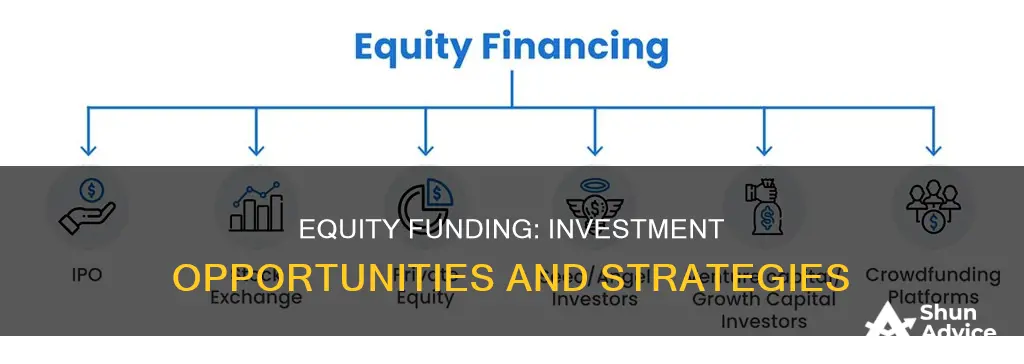
Equity funding is a way for businesses to raise capital by selling shares to investors. This can be done through several sources, including angel investors, crowdfunding platforms, venture capital firms, corporate investors, and initial public offerings (IPOs). Equity funding is particularly important for startups as it allows them to finance plant assets and initial operating expenses. Investors benefit from equity funding by receiving dividends or an increase in share price. While equity funding offers an alternative source of funding for businesses, it also comes with the disadvantage of diluting ownership and operational control.
| Characteristics | Values | |
|---|---|---|
| Definition | Equity financing is the process of raising capital through the sale of shares. | |
| Sources of Equity Financing | Angel investors, crowdfunding platforms, venture capital firms, corporate investors, initial public offerings (IPOs) | |
| Advantages | Alternative funding source, access to business contacts and management expertise, no obligation to repay money | |
| Disadvantages | Dilution of ownership and operational control, lack of tax shields |
What You'll Learn

Equity financing is an alternative to debt financing
Companies can choose between equity financing and debt financing to raise capital. Equity financing is the process of raising capital by selling shares in a company. Debt financing, on the other hand, involves taking out a loan from a lender, such as a bank, and then paying it back with interest.
However, there are also downsides to equity financing. One of the biggest drawbacks is that business owners will have to give up a certain level of control and ownership of their company. Investors may gain a significant ownership percentage and have a say in business decisions. Another disadvantage is the time it takes to secure equity financing. Negotiating the investment package and determining the percentage stake in exchange for funding can be a lengthy process, especially if there are multiple investors involved. Furthermore, equity financing usually involves more legal work, making it a more time-consuming process overall compared to debt financing.
When deciding between equity financing and debt financing, companies should consider their specific needs and circumstances. Debt financing may be a better option for those who want to maintain full ownership and control of their business and are able to take on the burden of loan repayments. On the other hand, equity financing can be a good choice for businesses that need capital quickly, as it can provide funding without the immediate pressure of debt repayment. It is also a viable option for companies that may not qualify for debt financing due to their financial situation or credit history. Ultimately, the decision depends on factors such as cash flow, future profitability, and the importance of retaining control of the company.
Index Funds: A Smart Investment Strategy for Long-Term Wealth
You may want to see also

Equity financing provides access to business contacts and management expertise
Equity financing is a way for companies to raise capital by selling shares to investors. This can be done through several sources, including angel investors, crowdfunding platforms, venture capital firms, corporate investors, and initial public offerings (IPOs).
One of the main advantages of equity financing is that it provides access to business contacts and management expertise. Angel investors and venture capitalists, in particular, often bring their successful backgrounds and connections to the table, which can be invaluable to a growing company. They may also assist with management expertise and access to other sources of capital. This is especially crucial during the startup period of a company when these resources are most needed.
Angel investors are wealthy individuals who invest in businesses that they believe have the potential to generate higher returns in the future. They typically bring their business skills, experience, and connections to the table, which can be highly beneficial to the company in the long term. Venture capitalists, on the other hand, are a group of investors who invest in businesses with high growth potential and typically receive a larger stake in the company compared to angel investors.
Equity financing can also provide access to other sources of capital. For example, crowdfunding platforms allow a number of people to invest small amounts in a company, and these contributions are summed up to reach the funding target. Corporate investors are another source of equity financing, where large companies invest in private companies to establish strategic partnerships and provide funding.
Overall, equity financing provides a valuable opportunity for companies to gain access to business contacts, management expertise, and additional sources of capital, which can be crucial for their growth and success, especially during the startup stage.
Saudi Wealth Fund: Where is it Invested?
You may want to see also

Equity financing dilutes ownership and operational control
Equity financing involves selling a portion of the equity in a company in exchange for cash. This means that investors who purchase the shares are also purchasing ownership rights to the company.
While equity financing is a great way to raise capital, it does come with the disadvantage of diluting ownership and operational control. Company owners must give up a portion of their ownership, and with it, some of their control. If the company becomes profitable, a certain percentage of company profits must be given to shareholders in the form of dividends.
Many venture capitalists request an equity stake of 30-50%startups that lack a strong financial background. This can be a significant amount of corporate power to give up, and so it limits the options for equity financing.
Additionally, investors may want to be consulted whenever the company makes changes. In exchange for the large amounts that angel investors and venture capitalists invest, business owners will have to forfeit a percentage of ownership and control.
Equity financing is almost always counterbalanced with some type of debt financing. Debt financing costs less and leaves the company with more control.
Strategies to Secure Investment Funding: A Comprehensive Guide
You may want to see also

Equity financing lacks tax shields
Equity financing is the process of raising capital through the sale of shares. Companies may sell a portion of their equity to friends and family, professional investors, or the public through an initial public offering (IPO). This type of financing is often used when companies need to raise cash without taking on debt.
To avoid double taxation, some companies may choose to reinvest earnings instead of paying out dividends. Additionally, companies may opt for debt financing to take advantage of the tax shields it offers. The savings from tax shields can be used to increase cash dividends to shareholders or reinvested to increase the company's value, leading to higher share prices and capital gains for shareholders.
The lack of tax shields in equity financing can impact a company's decision to allocate its equity and debt. It may also encourage companies to explore alternative financing options, such as debt financing, to minimise their tax burden.
Thailand's Climate Investment Funds: A Historical Overview
You may want to see also

Equity financing is a good option for businesses with little or no revenue
One of the main advantages of equity financing for businesses with little or no revenue is that it provides access to capital without the need for collateral or a strong financial track record. This can be crucial for startups or small and medium-sized businesses that may not qualify for traditional loans from banks. By selling shares to investors, these businesses can raise the funds they need to invest in their operations and fuel their growth.
Another benefit of equity financing is that it often provides access to valuable business contacts, management expertise, and other sources of capital. Many investors, such as angel investors or venture capitalists, bring their business skills, experience, and connections to the table. This can be especially advantageous for young companies that can benefit from the guidance and resources that these investors can provide.
Additionally, equity financing can be less risky than debt financing for businesses with little or no revenue. With equity financing, the company does not have to worry about making regular loan repayments, which can be a burden for a business that is not yet generating significant revenue. Instead, investors typically focus on the long-term potential of the business and are willing to wait for their returns.
However, it is important to consider the disadvantages of equity financing as well. One significant drawback is that equity financing involves giving up a portion of ownership and control in the company. This can be a difficult decision for business owners, especially if they are concerned about maintaining decision-making authority. Additionally, if the company becomes profitable, a percentage of the profits must be distributed to shareholders in the form of dividends.
In conclusion, equity financing can be a good option for businesses with little or no revenue as it provides access to capital, valuable resources, and expertise, without the burden of loan repayments. However, it is important for business owners to carefully weigh the advantages against the potential loss of ownership and control before deciding on equity financing.
UK Funds: Your Investing Journey Simplified
You may want to see also
Frequently asked questions
Equity funding is when a company raises capital by selling shares to investors. The investors then own a percentage of the company and are entitled to a share of the profits.
Equity funding is a good option for companies that don't have the revenue or financial history to apply for a business loan. It also means that the company doesn't have to worry about making regular loan repayments, which helps manage cash flow.
The main drawback of equity funding is that company owners must give up a portion of their ownership and decision-making control. If the company becomes profitable, a percentage of profits must be given to shareholders in the form of dividends.







